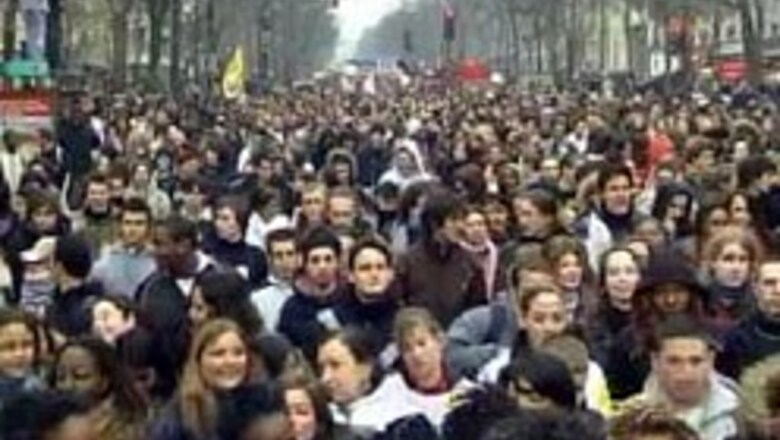
views
Paris, France:: More than a million protesters took to the streets of France on Tuesday hoping to kill a new labor law that will allow employers to more easily hire and fire young, first-time workers.
In Paris, pockets of demonstrators threw bottles and rocks at riot police stationed around the Place d'Italie. Police responded by firing paint balls, marking some of demonstrators.
In all, 383 people were arrested in Paris and another 243 were arrested in other parts of the country, according to a spokesman for the Interior Ministry.
Those arrests bring to 3,500 the number taken into custody in demonstrations nationwide during the past two weeks.
Interior Minister Nicolas Sarkozy met with riot police afterward. One captain reportedly told him that Tuesday's demonstrations were not as violent as those last week.
A spokesman for the Interior Ministry said there were 18 reports of minor injuries. He did not say whether they were to demonstrators or police.
Protesters were on the streets in 150 French cities for a fifth "day of action." An estimate by the leaders of the union CGT put the turnout at more than 3 million, but the French Interior Ministry estimated the crowd at just over 1 million.
The Interior Ministry said it estimated about 84,000 people demonstrated in Paris, with another 944,700 in other French cities. That would put the national total at 1,028,700.
The Interior Ministry said it deployed 4,000 police Tuesday to handle any problems.
Representatives of at least five of the 12 unions participating in Tuesday's protest agreed to talk Wednesday with government officials.
Although union organizers had called for a general strike Tuesday, it was largely ineffective. The French transportation system was slightly affected -- some flights were canceled or delayed, and train service was curtailed -- but on the whole continued to operate.
The debate over the law -- the "first employment contract," or CPE in French -- has turned into a debate on whether France's generous worker benefits can continue and whether France can compete in a global marketplace.
The law allows employers to hire and fire workers 26 years old and under at any point during their first two years on the job.
French President Jacques Chirac signed the act into law Sunday, but said he wanted its implementation suspended so that it could be amended in two ways: The term when employers could hire and fire would be cut to one year, and workers would have to be given a reason for the firing.
PAGE_BREAK
The French National Assembly and the Senate have yet to debate and vote on Chirac's proposed amendments.
But during a question-and-answer session at the National Assembly on Tuesday, Prime Minister Dominique de Villepin remained defiant.
"We do not have the right to give in, and I will not give in," he said. "The priority is to come out of the current crisis. It is not in the interest of anyone, especially not of the youth who are looking for jobs and awaiting solutions to their difficulties."
Chirac and de Villepin have called for talks with unions representing workers and students. Union leaders have said parliament must withdraw the law.
Union representatives are to meet at the French Senate on Wednesday for talks with the majority party, though it was not clear at what level the talks would be held.
The French parliament, both the National Assembly and the Senate, are dominated by the ruling, right-wing Union for a Popular Movement.
Villepin rammed the law through parliament with little debate, and has refused to back down, saying France must do something for thousands of young people who are unemployed.
In November, rioters protested and burned hundreds of cars to demonstrate their frustration.
The French national unemployment rate hovers around 10 percent and is higher than 23 percent among young workers. In the poor suburbs of French cities, scene of the riots last fall, the unemployment rate is above 50 percent.
Employees have strong job protections under current law; it is difficult and expensive for a businesses of any size to fire a worker.
As a result, French firms have been reluctant to expand payrolls.
Villepin has said France must do something to stimulate hiring. However, Villepin's decision to push through the law without talks first with the unions or any significant debate in the National Assembly has become a point of contention.
Villepin has said he wants to run for president next year, but polls show his popularity has plummeted because of his handling of the CPE.




















Comments
0 comment